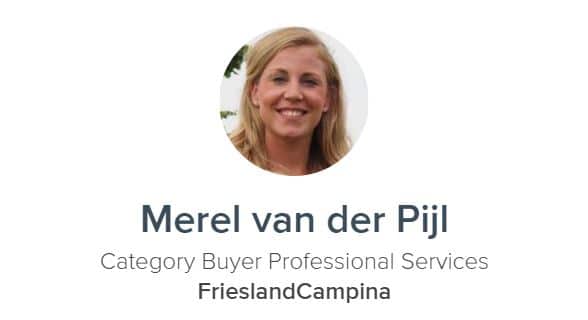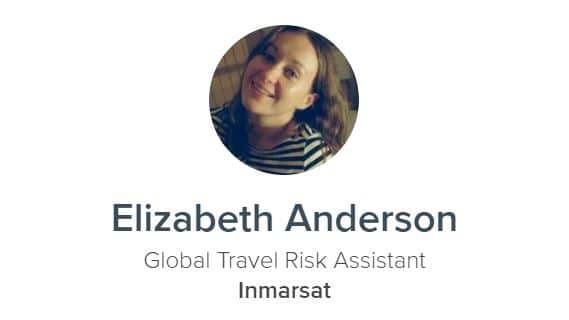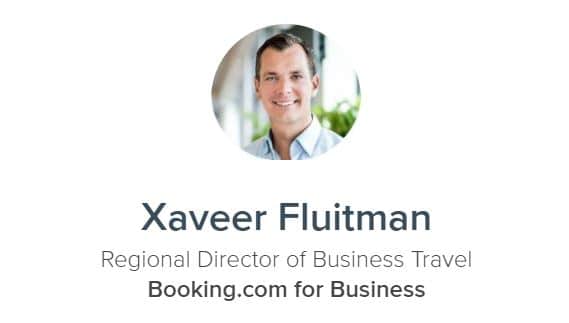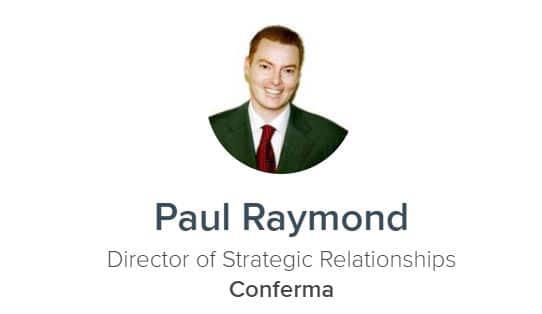Van 25 tot en met 27 september is de Business Travel Summit in Amsterdam! Wij met trots mediapartner. Wat kunt u verwachten? We geven alvast een preview, in het Engels, wat de sprekers u gaan vertellen! Toppers van CWT, Friesland Campina, Booking,com etc etc
Meer weten? http://amsterdam.businesstravel-summit.com/
De hele sprekerslijst?
http://amsterdam.businesstravel-summit.com/conference/speakers
INTERVIEWS MET DE SPREKERS OVER WAT U KUNT VERWACHTEN:
BUSINESS TRAVEL SUMMIT AMSTERDAM In Conversation With… Samantha Simms, global data privacy officer, Carlson Wagonlit Travel

Session title: EU GDR and what travel buyers need to know
Tell us about your session in one sentence? My session will help you understand the journey of personal information through the complex travel web.
What is the single most important piece of advice/information buyers will take away from your talk?
There is support and guidance with your TMC in this new process. The industry cares and wants to work with you during this change.
What’s the biggest challenge facing buyers now and why?
Defining the roles and responsibilities of who is responsible for the data of your traveller/ employee.
What’s the biggest opportunity they should be taking advantage of and why?
Come to my session – hear the facts about this topic from a person who lives and breathes it. Speak to the experts, share views with your peers. It’s time to take action in this area.
Why is it important to have a summit dedicated to buyers in the Nordics and Benelux?
There are key changes happening in the EU, public sector procurement, oil and gas, engineering companies – there are nuances in each market, so it’s vital we talk with customers directly here.
What does being traveller-centric mean to you? How does it benefit buyers?
To me, it means the traveller is the owner of their personal information. We have to respect the travellers’ privacy and rights – this is really important to me.
NDC – good or bad?
It’s really important; the flow of data will be impacted, when the matrix changes or evolves and we have to be part of the conversation.
Why are you looking forward to BT Summit Amsterdam?
Being able to speak to people face to face and really understand the issues affecting teams in the Nordics and the Benelux, as well as meeting buyers from Europe and talking to different clients.
_________________________________________________________________________
In Conversation With… Deborah Short, Willis Towers Watson
Session title: Add ground transportation to your programme and find new savings

Tell us about your session in one sentence? Ground transportation: why and how.
What is the single most important piece of advice/information buyers will take away from your talk?
How to go about implementing ground transportation.
What’s the biggest challenge facing buyers now and why?
A flux of new booking channels and the effect on a global programme.
What’s the biggest opportunity they should be taking advantage of and why?
The ability to globalise data into a single source.
What does being traveller-centric mean to you? How does it benefit buyers?
Putting the traveller first benefits buyers by expanding the traditional programme.
NDC – good or bad?
Too soon to say but with BA passing on costs not so good.
_________________________________________________________________________
In Conversation With… Merel Vander Pijl, Category Procurement Buyer Professional Services, FrieslandCampina
Session title: 10 ways to save money and drive programme value

What’s your biggest tip to buyers when it comes to saving costs?
The best tip for buyers to save money is not to travel. Invest in technology that works accordingly. However, you cannot stop travel and, therefore, the second-best tip is to invest in online solutions. Booking business travel should be as simple as booking a holiday. Business travel doesn’t have to be more complex. It will save a lot of money once the right tooling is in place. It is very easy to still call or mail TMCs but that comes with a price.
What’s the biggest challenge facing buyers now and why?
It is still difficult to get a complete travel programme in place. What do you add to the programme? Only travel across boarders or is travel also when you travel from office to office.
What’s the biggest opportunity they should be taking advantage of and why?
The travel industry is changing rapidly at the moment. Environment is shifting towards an online world and TMCs are getting more and more online driven. It is wise to check your TMC and see if they are still operating as economically as possible.
Why is it important to have a summit dedicated to buyers in the Nordics and Benelux?
It is important to share knowledge and see some best practices.
Why are you looking forward to BT Summit Amsterdam?
I am looking forward to the BT Summit because there are very interesting speakers, of whom I hope to learn some new things.
_________________________________________________________________________
In Conversation With… Michael Reigel, Comtravo
Session title: The great BT Summit Pitch Off: Which start-ups are disrupting business travel?

What is the single most important piece of advice/information buyers will take away from your presentation?
The business model of classical travel agencies will shift in the next two to three years.
What’s the biggest challenge facing buyers now and why?
For SME buyers, there is no real one-stop shop to simply buying again.
What’s the biggest opportunity they should be taking advantage of and why?
Make use of the data they have! They receive so much data form their customers which can be used more wisely to get more business but its potential is often totally underestimated.
Why is it important to have a summit dedicated to buyers in the Nordics and Benelux?
It is important to have summits like this in any country/region. Dedicating it to a certain region may help to solve typical ‘problems’ within that area. Also it is good to make contacts and get an idea how others approach their challenges.
Why are you looking forward to BT Summit Amsterdam?
We believe we can truly contribute and share knowledge on the BT Summit.
Should buyers embrace disruptive start-ups or be wary of them?
For sure! If they don’t – they will lose out! They should at least test and be aware of the capabilities and opportunities.
What good can they bring to a travel programme?
More simplicity!
Should buyers encourage travellers to use disruptive suppliers?
Again – I think it is important not to miss the trend and therefore test and try out.
_________________________________________________________________________
In Conversation With… Elizabeth Anderson, Global Travel Risk Assistant, Inmarsat
Session title: Ask the experts: how to implement a risk management programme

Tell us about your session in one sentence?
It’s a good opportunity to get into the practical details of setting up a travel risk plan.
What is the single most important piece of advice/information buyers will take away from your talk?
Identifying the loopholes and joining up the dots to ensure a comprehensive travel risk programme.
What are the top three tips you would give to travel managers/buyers when it comes to implementing a risk travel management programme?
Write your own Travel Safety Policy with the assistance of your security provider to understand the various risks and use this as a guide for your travel safety management. Know who your travellers are – understand the various profiles and types of risks.
Learn effective ways of communicating with your travellers.
Do you think – overall – organisations provide adequate travel risk management? Do you feel some countries are better than others? Why is it so essential right now?
I don’t think that companies yet provide fully adequate travel risk management but there is a growing focus on it and while larger companies are often better prepared due to the widespread recognition of risks and availability of resources, smaller and medium sized companies are increasingly aware of the need to have a plan in place but often have less resource. It is particularly important now where the risks at least appear to be growing and it is an opportunity to advise travellers on the various risks surrounding travel. I don’t know if certain countries are better than others but those such as the UK, US and Germany as well as Asia-Pac countries are likely the most focused.
What’s the biggest challenge facing buyers now and why?
Getting senior management and colleagues from different departments involved (establishing ownership and types of risks), communicating effectively with travellers as well as understanding the different types of risks that can affect travellers.
What’s the biggest opportunity they should be taking advantage of and why?
Keeping up with publications to constantly review your travel risk programme, using the resources you have and speaking to your security provider regularly.
Why is it important to have a summit dedicated to buyers in the Nordics and Benelux?
Because of the number of companies based in this area who engage in regular international travel including travel between these countries.
Why are you looking forward to BT Summit Amsterdam?
To meet peers and find out what they are doing.
_________________________________________________________________________
In Conversation With… Xaveer Fluitman, Regional Director Business Travel, Booking.com
Session title: How to be traveller-centric while keeping control

What does traveller centricity mean to you?
To us at Booking.com, traveller centricity means choice, flexibility, transparency and ease of use. And that’s what we aim to bring as the core of all our solutions for business travellers and travel managers. We believe that booking a business stay should be every bit as smooth and enjoyable as making plans for your next holiday.
What will it look like in the future?
Business travel is undergoing a transformation inspired by technology, which continues to positively disrupt how we plan, book and stay, whether travelling for leisure or business. The traveller centric future is seamless, personalised and easily adaptable on the go. It’s all about removing complexity and opening up additional freedom and choice.
What is the single most important piece of advice you would share with buyers about traveller centricity?
A traveller centric approach that provides optimal flexibility and choice doesn’t mean sacrificing oversight or duty of care. With the right platform, tooling and technology, buyers can keep up with travellers’ ever-evolving expectations and needs with the confidence that they’re making the right choices, all the while maintaining the desired levels of control.
What impact will it have on buyers and travellers?
If you give travellers the personal choice and flexibility they crave, it not only means happier travellers and more productive trips, it also means peace of mind and efficiency for buyers, not to mention more travellers booking their travel within policy. It’s all about leveraging the right tooling and finding smart solutions that are tailored to modern business needs and a workforce increasingly on the move.
Why are you looking forward to being part of BT Summit Amsterdam?
We’re really looking forward to being a part of BT Summit Amsterdam, as it’s a great opportunity to connect with more of our customers and share ideas with other like-minded companies in the business travel space. We always learn a lot from the discussions that occur and leave inspired with additional ideas to keep innovating and enhancing our product offering further.
_________________________________________________________________________
In Conversation With… Paul Raymond Director of Strategic Relationships Conferma
Session title: The EU and your card programme

What is the biggest political development to affect corporate payment programmes and how/why?
One of the most significant changes in the corporate payment space is the European Union Regulation on Interchange Fees for card-based transactions (also known as the IFR).
This means that consumer card transactions are subject to a lower interchange rate. Additionally, individually settled corporate cards are defined within the same rules as consumer cards with the associated reduced interchange. However, payment cards that are for business expenses only and centrally billed to a company are not subject to the cap on interchange fees.
Our belief is that the differential in interchange for the two card definitions will lead to a significant move towards centrally settled solutions in order to maintain existing rebates and remove the exposure to potential transaction fees on individually settled cards. Centrally settled virtual payment solutions now offer an established route to address the IFR challenges and a growing number of corporates see this as the optimal solution when planning their corporate payment strategy.
What is PSD2 and what impact will that have on buyer’s programme?
The objectives of the EU’s wide-ranging Directive on Payment Services (known as PSD2) include regulating new types of payment service providers, prohibiting card surcharges and improving the security of online payments. It is scheduled to take effect in January 2018. The outline of the directive has been agreed for several years, but the most recent draft suggests that corporate payments will be exempt.
Corporate cards tend to be subject to much lower levels of fraud because their usage is already under stringent security processes. This means that the additional cost and complexity of PSD2 controls do not have the same level of urgency in the corporate payments space that retail payment mechanisms attract.
What opportunities and challenges will Brexit prove to have on travel programmes? Clearly, the biggest challenge Brexit creates is that of uncertainty. It would be a brave person who was able to state with any confidence that the overall effect of Brexit will be either positive or negative. Ultimately, commercial practices will be subject to change and with that, there is likely to be cost implication. How significant those costs are will depend on the ongoing discussions between the UK government and the wider EU. At this stage, indications are that the divorce will be relatively amicable as both sides recognise the requirement to remain trusted trade partners, any more than that would be supposition.
If you were erring on the side of positivity the UK could characterise a decoupling from Europe as an opportunity to strengthen trade relations with other key partners, most notably the USA, and to leverage the independence to allow a more flexible approach to all aspect of a trade agreement. While this position has some credence, it is also possible to make an alternative argument that as a single entity the UK has less leverage in any negotiations and indeed the EU is weakened by the loss the UK`s involvement.
Why are you looking forward to taking part in the Summit this year?
From Conferma`s perspective 2017/18 is a very exciting period in the business` history. With a number of key developments and partnerships coming to fruition, it is an ideal time for us to extend our reach, build on our brand awareness and network more closely with the quality of attendees that the Summit attracts.
_________________________________________________________________________
In Conversation With… Michael Gloor, Senior Director Sales France and Benelux, Lufthansa Group
Session title: How buyers can benefit from NDC and airline direct connects

NDC – a good or bad thing? What’s the most important thing buyers should be aware of?
We at the Lufthansa Group believe that NDC is a fantastic opportunity for the industry. This is a great chance for buyers to become actively involved now, in shaping the usage of this standard in this crucial phase. With that in mind, we are really looking forward to the dialogue at this conference.
What’s the biggest challenge facing buyers now and why?
The more booking options become available to the corporate traveller, the more relevant it becomes for the travel buyer to manage all interfaces, to enforce compliance within the travel policy. Therefore, a standard like NDC, which is rapidly gaining ground at various distribution technology providers and suppliers, is really good news; it facilitates the integration of content from various sources and airlines into e.g. an online booking tool or the expense reporting environment.
What’s the biggest opportunity they should be taking advantage of and why?
Corporate buyers will be able to proactively negotiate beyond the price point and tailor our wide range of offerings to their travellers’ needs. The idea would be to eventually offer various employee groups relevant corporate bundles in an interactive way. For some target groups this could be a powerful method for employee branding and talent acquisition.
Why are you looking forward to BT Summit Amsterdam?
We clearly see momentum in the deployment and level of attention that NDC is currently receiving. By being here on behalf of the Lufthansa Group, I would like to hear your ideas, identify your priorities and needs and use your input as we are moving along with our developments. We believe this is the right time to engage in collaboration and move forward together.

